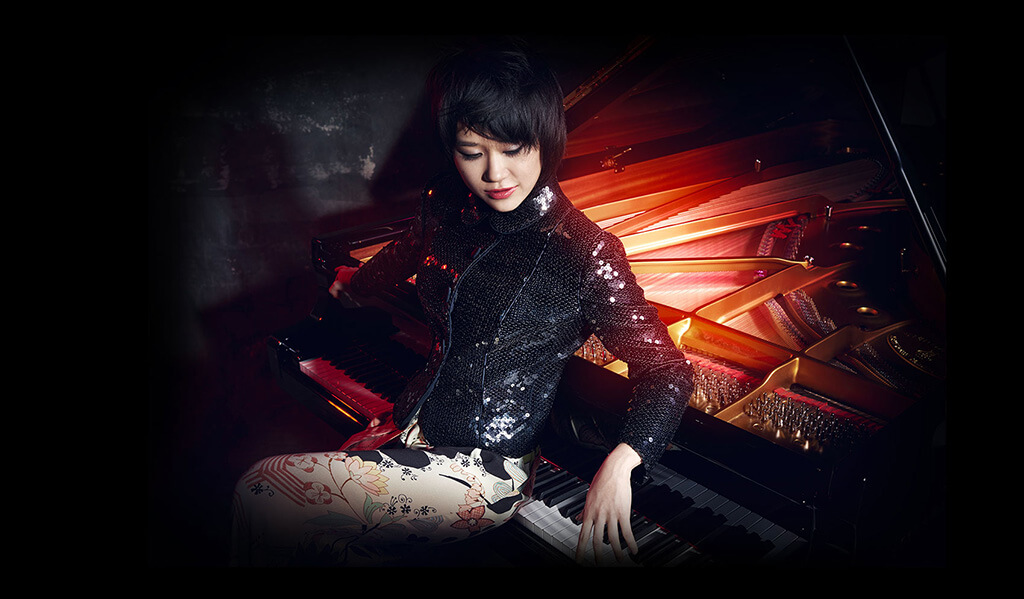
In classical music, there is an inherent tension between tradition and modernity, between canonical power and contemporary trends and needs. The question has been posted again and again: if something is by definition old, how do you make it new without applying too radical of a pressure on it? Or, how do you transform an antique into an up-to-date, functional device?
Yuja Wang’s answer seems to be: invest in unheard intensity at all levels; declare absolute control, profess obsessive precision; and dramatize only in proportion to feasible expectations.
The novelty of her approach lies as much on the pianist herself as on our contemporary cultural circumstances. For, on the one hand, it is her own talent, flexibility, and lightning speed that have brought her to the forefront of the classical scene. Her ability to emphasize on intricate details of a given musical piece, while upholding to a crystal clear tempo, uncovers otherwise hidden possibilities. This process of mining for tiny musical particles can potentially produce a transformative overall result. A good example here would be Mark Swed’s observation: “with a flick of her dazzling fingers on the keys”, he writes, “[Yuja Wang] sends an electric current through the ‘Hammerklavier’ that makes it modern music, Beethoven for the 21st century”.
On the other hand, it is obvious that her musical language does not remain constrained by its audible limits, but leaks into a visual domain. She does not only emit a sound, but also an image — she looks inward as well as outward, at herself as much as at her audience. Once introverted poets, piano players today have transformed into extroverted performers. Wang’s intense body language, the abrupt movements of her head, her occasional — watchful but dynamic — jumping on her bench, and her sense of fashion, all visible from a relatively good seat — don’t all of those tendencies direct our attention toward an audiovisual spectacle rather than a strictly defined musical experience? And is there a better way for a pianist to adjust to our contemporary need for constant production and consumption of images?
To understand this twofold aspect of Wang’s playing, her unique sound and her seductive visuality, one has to look both at her own background and at major pianists of the past who, one way or another, defined their own era. The two, in fact, converge at a single point, namely the Curtis Institute of Music, which Wang attended from 2003 to 2008. In Curtis, she explored the depth of the Russian composers under the guidance of Gary Graffman, himself a superb pianist, a student of Vladimir Horowitz, and the director of the institute from 1986 to 2006. And she was still attending Curtis when she got her first major break: in 2007, she filled in for Martha Argerich, whose cancellations have been infamously frequent, playing Tchaikovsky’s First Piano Concerto with the Boston Symphony Orchestra.
Wang seems to have gotten something from all three pianists mentioned above. From Horowitz, in whatever form his performances became available to her, she has inherited the high-powered but controlled excitement, the insistence on shadows, colors, and contrasts, as well as his highly personalized interpretations, which are usually described as more emotional than intellectual. From Graffman comes the development of her left hand as a complementary but powerful tool, indispensable from any notion of fullness –which, of course, Graffman himself had to develop to that extent as a survival tactic, due to a well-documented injury at two fingers of his right hand. And Argerich has served as a blueprint of and for feminine intensity, an euphemism for Argerich’s famous wildness, a variety of which is evident in every aspect of Wang’s own playing — without, however, what in Argerich might be perceived as instability, an unexpected change of momentum, an over, or underinvestment in elements that don’t quite fit into the overall pattern.
All of those pianists, and especially Horowitz and Argerich, bring into the discussion one more, unavoidable ingredient: a notion of celebrity, a touch of publicity, a self-aware image under perpetual evolution. Combined with their technical proficiency, it attaches to their performances an almost cinematic quality which the artists themselves, at least sporadically, seem to welcome like an actor who has been permitted to indulge in his improvised theatrics.
Our age welcomes this visual aspect, and Yuja Wang welcomes our age. In a recent interview, she compared herself to an actress. Anyone watching her performances should have already known as much.
#LUDWIGVAN
Want more updates on Toronto-centric classical music news and reviews before anyone else finds out? Follow us on Facebook or Twitter for all the latest.